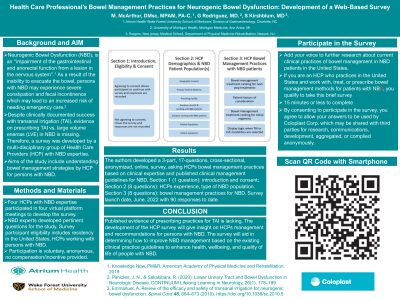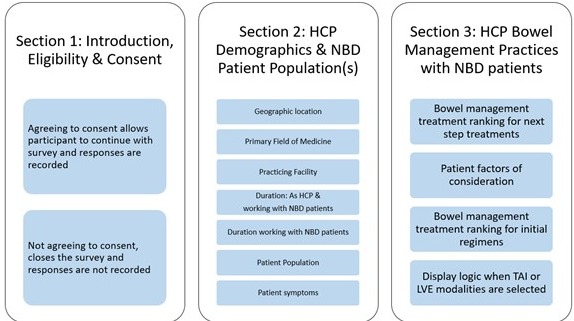Back


Poster Session A - Sunday Afternoon
Category: Colon
A0097 - Health Care Professional’s Bowel Management Practices for Neurogenic Bowel Dysfunction: Development of a Web-Based Survey
Sunday, October 23, 2022
5:00 PM – 7:00 PM ET
Location: Crown Ballroom

Has Audio

Mackenzie Jarvis, MPAM, PA-C, DMSc
Atrium Health Wake Forest
Charlotte, NC
Presenting Author(s)
Mackenzie McArthur, MPAM, PA-C, DMSc1, Gianna M. Rodriguez, MD2, Caroline Churchhill, PhD3, Steven Kirshblum, MD4
1Atrium Health Wake Forest, Charlotte, NC; 2University of Michigan, Michigan Medicine, Ann Arbor, MI; 3Coloplast Corp., Minneapolis, MN; 4Rutgers NJ Medical School, West Orange, NJ
Introduction: Neurogenic Bowel Dysfunction (NBD), is an “impairment of the gastrointestinal and anorectal function from a lesion in the nervous system”.1 As a result of the inability to evacuate the bowel, persons with NBD may experience severe constipation and fecal incontinence which may lead to an increased risk of needing emergency care.2 Despite clinically documented success with transanal irrigation (TAI) devices in NBD, TAI prescribing evidence is missing. Therefore, a survey was developed by a multi-disciplinary group of Health Care Providers (HCP)with NBD expertise. Aims of the study include understanding bowel management strategies by HCP for persons with NBD.
Methods: Four HCPs with NBD expertise participated in four virtual platform meetings to develop the survey. NBD experts developed pertinent questions for the study. Survey participant eligibility includes residency in the United States, HCPs working with persons with NBD. Participation is voluntary, anonymous, no compensation/incentive provided.
Results: The authors developed a 3-part, 17-questions, cross-sectional, anonymized, online, survey, asking HCPs bowel management practices based on clinical expertise and published clinical management guidelines for NBD. Section 1 (1 question): introduction and consent; Section 2 (8 questions): HCPs experience, type of NBD population. Section 3 (8 questions): bowel management practices for NBD. Survey launch date, June, 2022 with data analysis in September, 2022.
Discussion: Published evidence of prescribing practices for TAI is lacking. The development of the HCP survey will give insight on HCPs management and recommendations for persons with NBD. The survey will aid in determining how to improve NBD management based on the existing clinical practice guidelines to enhance health, wellbeing, and quality of life of people with NBD.
1. Knowledge Now, PM&R. American Academy of Physical Medicine and Rehabilitation. 2019.
2. Panicker, J. N., & Sakakibara, R. (2020). Lower Urinary Tract and Bowel Dysfunction in Neurologic Disease. CONTINUUM Lifelong Learning in Neurology, 26(1), 178–199.

Disclosures:
Mackenzie McArthur, MPAM, PA-C, DMSc1, Gianna M. Rodriguez, MD2, Caroline Churchhill, PhD3, Steven Kirshblum, MD4. A0097 - Health Care Professional’s Bowel Management Practices for Neurogenic Bowel Dysfunction: Development of a Web-Based Survey, ACG 2022 Annual Scientific Meeting Abstracts. Charlotte, NC: American College of Gastroenterology.
1Atrium Health Wake Forest, Charlotte, NC; 2University of Michigan, Michigan Medicine, Ann Arbor, MI; 3Coloplast Corp., Minneapolis, MN; 4Rutgers NJ Medical School, West Orange, NJ
Introduction: Neurogenic Bowel Dysfunction (NBD), is an “impairment of the gastrointestinal and anorectal function from a lesion in the nervous system”.1 As a result of the inability to evacuate the bowel, persons with NBD may experience severe constipation and fecal incontinence which may lead to an increased risk of needing emergency care.2 Despite clinically documented success with transanal irrigation (TAI) devices in NBD, TAI prescribing evidence is missing. Therefore, a survey was developed by a multi-disciplinary group of Health Care Providers (HCP)with NBD expertise. Aims of the study include understanding bowel management strategies by HCP for persons with NBD.
Methods: Four HCPs with NBD expertise participated in four virtual platform meetings to develop the survey. NBD experts developed pertinent questions for the study. Survey participant eligibility includes residency in the United States, HCPs working with persons with NBD. Participation is voluntary, anonymous, no compensation/incentive provided.
Results: The authors developed a 3-part, 17-questions, cross-sectional, anonymized, online, survey, asking HCPs bowel management practices based on clinical expertise and published clinical management guidelines for NBD. Section 1 (1 question): introduction and consent; Section 2 (8 questions): HCPs experience, type of NBD population. Section 3 (8 questions): bowel management practices for NBD. Survey launch date, June, 2022 with data analysis in September, 2022.
Discussion: Published evidence of prescribing practices for TAI is lacking. The development of the HCP survey will give insight on HCPs management and recommendations for persons with NBD. The survey will aid in determining how to improve NBD management based on the existing clinical practice guidelines to enhance health, wellbeing, and quality of life of people with NBD.
1. Knowledge Now, PM&R. American Academy of Physical Medicine and Rehabilitation. 2019.
2. Panicker, J. N., & Sakakibara, R. (2020). Lower Urinary Tract and Bowel Dysfunction in Neurologic Disease. CONTINUUM Lifelong Learning in Neurology, 26(1), 178–199.

Figure: Breakdown of sections included within the Health Care Professional survey
Disclosures:
Mackenzie McArthur: Abbvie – Speakers Bureau. Coloplast – Advisory Committee/Board Member. Evoke – Advisory Committee/Board Member. Phathom Pharmaceuticals – Advisory Committee/Board Member, Speakers Bureau. Salix Pharmaceuticals – Advisory Committee/Board Member, Speakers Bureau. Sanofi – Advisory Committee/Board Member.
Gianna Rodriguez: Coloplast – Consultant. Wellspect – Consultant.
Caroline Churchhill: Coloplast Corp – Employee.
Steven Kirshblum: Coloplast – Advisory Committee/Board Member.
Mackenzie McArthur, MPAM, PA-C, DMSc1, Gianna M. Rodriguez, MD2, Caroline Churchhill, PhD3, Steven Kirshblum, MD4. A0097 - Health Care Professional’s Bowel Management Practices for Neurogenic Bowel Dysfunction: Development of a Web-Based Survey, ACG 2022 Annual Scientific Meeting Abstracts. Charlotte, NC: American College of Gastroenterology.

